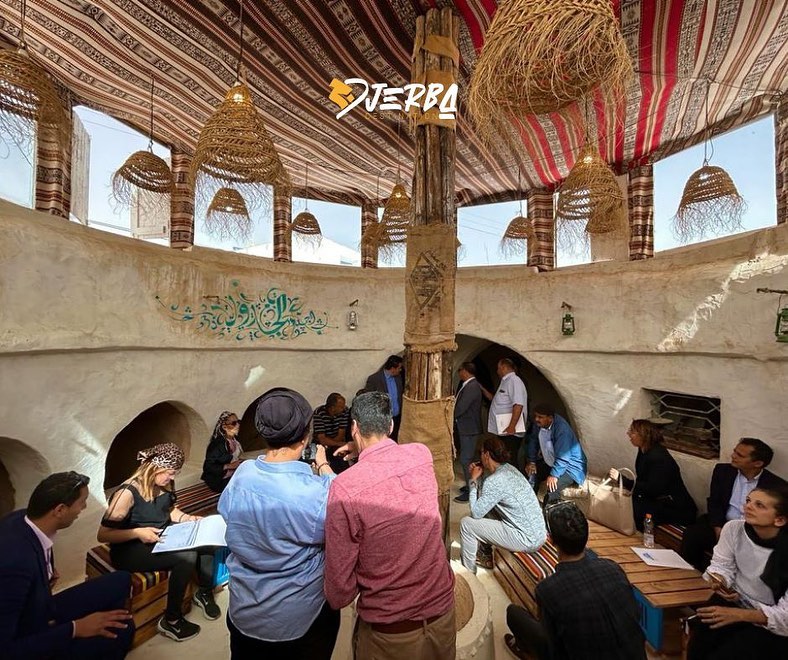Promote Djerba’s culinary heritage to diversify and deseasonalize the tourism offer
The Culinary Road of Tunisia is the road of all those, professionals and enthusiasts, who take part and share their experiences and points of view. In Djerba, we met Hamda Abdellaoui, Executive Director of the Djerba Management Organisation (DMO Djerba). who told us about the project’s development opportunities for the island of Djerba.

When was the Djerba DMO created and what were its objectives?
DMO Djerbathe promotional and management body for the DJERBA® DESTINATION, was created in February 2021, with funding and support from the Swiss State Secretariat for Economic Affairs (SECO) and the Swisscontact Foundation, as well as in close collaboration with the Tunisian National Tourist Office (ONTT) and the Ministry of Tourism and Handicrafts (MTA).
Its role is to federate the largest possible number of local tourism-related players – hoteliers, travel agencies, restaurateurs, cultural and sporting activity providers and promoters, craftsmen, small-scale accommodation providers, guides, associations, museums, tourist entertainment centers, producers of local products – and to offer services to visitors to the island and to its members in order to promote the destination’s tourism offering.
What are DMO Djerba’s missions?
Our ambition is to renew Djerba’s image by proposing a diversified, inclusive and sustainable tourism offering that integrates all tourism possibilities, particularly seaside, sports, cultural, heritage, rest and wellbeing, leisure and health, including the creation of themed routes.
In order to promote the destination to our various target countries, we carry out projects of interest to Djerba by coordinating the various players involved in tourism, with the constant aim of improving the tourist and para-tourist offer to provide the best possible welcome to visitors.
What are your specific strategies and actions to promote sustainable tourism?
Our communication is resolutely centered on Djerba’s values, in order to promote its cultural originality, its plurality, its traditions and its gentle way of life, and to change the image traditionally associated with it. Djerba offers a wide range of tourist attractions to discover in all seasons.
This involves promotional campaigns focusing on direct marketing to tour operators and, above all, digital and participative marketing on the internet and social networks. We also run training programs for local tourism players on a variety of themes: culture, storytelling, culinary, themed tours, digital marketing, presentation of craft products and packaging & design, etc.
Why focus on culinary tourism? How do you go about it? Can you give us some examples of existing or future culinary experiments?
The olive tree and all its by-products are priceless assets that contribute to the cultural diversity of the island of Djerba, and we wanted to put them at the heart of the destination’s tourism offering.
As part of the La Route Culinaire de Tunisie program, we are currently developing a pioneering project entitled “The Flavors of Djerba”.
The goal? Promote the island’s cultural heritage, by enhancing the value of ancestral trades around olive oil and promoting local cuisine, in order to diversify and deseasonalize the tourist offer by capitalizing on Djerbien’s rich culinary heritage.

It is designed to bring together a number of players and professions to offer visitors unique experiences:
- Discover the underground oil mills found only in Djerba;
- Olive oil tasting workshop and promotion of the green gold of which our country is one of the largest producers;
- Tasting of typical dishes ;
- An innovative team-building activity: the gourmet workshop;
- Participation in the olive harvest.
Underground oil mills were a major component in the extraction of olive oil on the island and are located mainly in the countryside away from tourist areas. This project will offer new activities in areas that are less visited by tourists, but which hold great historical and cultural value. This activity allows travelers to meet the locals and discover another facet of the island.
Thanks to this initiative, we’ll be able to preserve the two underground oil mills on the proposed tour, and we hope to encourage the owners of the other ruined underground oil mills to develop and operate them in order to safeguard this neglected heritage. We hope this project will create direct and indirect jobs for the various partners involved in designing this new culinary offering: women’s associations, craftsmen, farmers, oil producers, shopkeepers and guides.

The revenues generated by this project will enable us to ensure its sustainability and development beyond the duration of the partnership. We plan to create other circuits to involve the local population in neighboring regions and maintain the existing workforce.
DMO Djerba has also launched Tunisia’s first regional culinary book, “Djerba l’île aux saveurs”[1 ], featuring 30 typical recipes and a presentation of the history of the island’s dishes and culinary traditions.
[1] This book was designed and published by DMO Djerba as part of the Tounes Wijhetouna financed by the European Union in Tunisia and the “Destination Sud-Est Tunisie” project financed by the State Secretariat for Economic Affairs SECO and implemented by Swisscontact , run in partnership with the Ministry of Tourism and Handicrafts – Tunisia and the Office National Du Tourisme Tunisien.